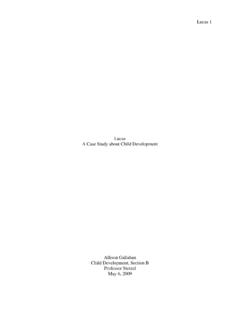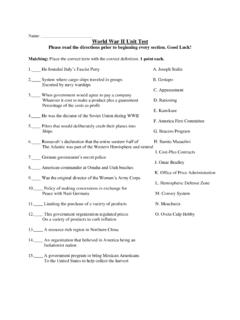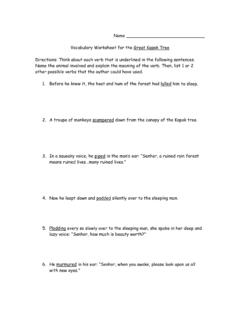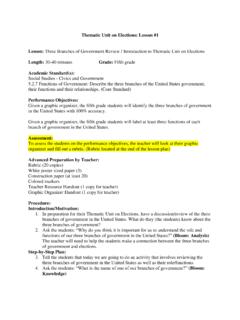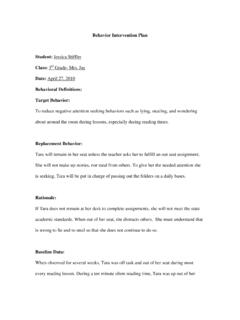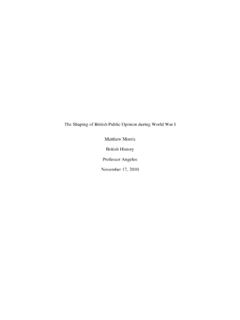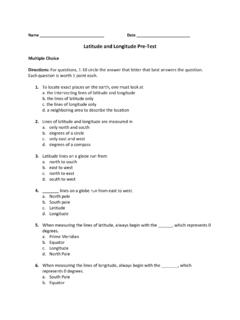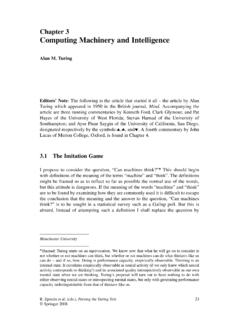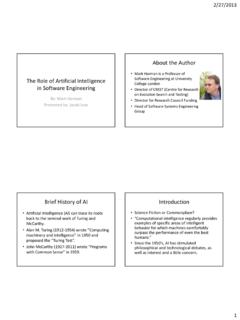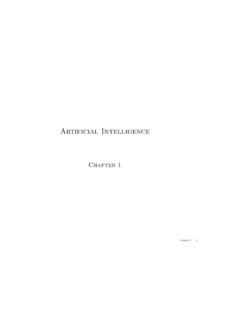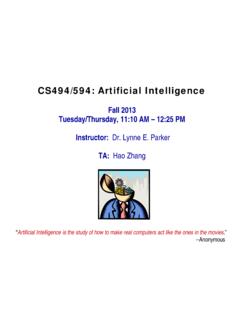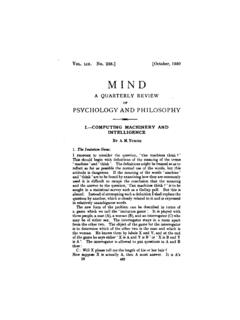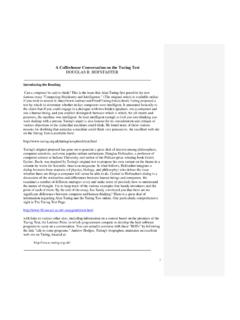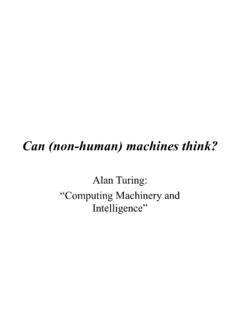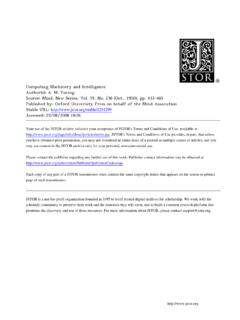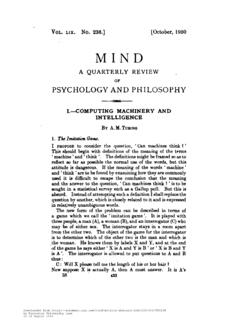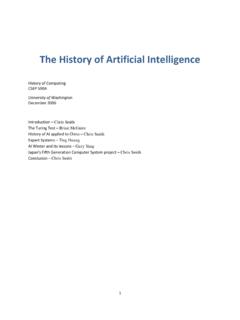Transcription of Computing Machinery and Intelligence A.M. Turing
1 Turing , (1950). Computing Machinery and Intelligence . Mind, 59, Machinery AND INTELLIGENCEBy A. M. Turing 1. The Imitation GameI propose to consider the question, "Can machines think?" This should begin withdefinitions of the meaning of the terms "machine" and "think." The definitions mightbe framed so as to reflect so far as possible the normal use of the words, but thisattitude is dangerous, If the meaning of the words "machine" and "think" are to befound by examining how they are commonly used it is difficult to escape theconclusion that the meaning and the answer to the question, "Can machines think?"is to be sought in a statistical survey such as a Gallup poll.
2 But this is absurd. Insteadof attempting such a definition I shall replace the question by another, which isclosely related to it and is expressed in relatively unambiguous new form of the problem can be described in terms of a game which we call the'imitation game." It is played with three people, a man (A), a woman (B), and aninterrogator (C) who may be of either sex. The interrogator stays in a room apartfront the other two. The object of the game for the interrogator is to determine whichof the other two is the man and which is the woman. He knows them by labels X andY, and at the end of the game he says either "X is A and Y is B" or "X is B and Y isA.
3 " The interrogator is allowed to put questions to A and B thus:C: Will X please tell me the length of his or her hair?Now suppose X is actually A, then A must answer. It is A's object in the game to tryand cause C to make the wrong identification. His answer might therefore be:"My hair is shingled, and the longest strands are about nine inches long."In order that tones of voice may not help the interrogator the answers should bewritten, or better still, typewritten. The ideal arrangement is to have a teleprintercommunicating between the two rooms. Alternatively the question and answers canbe repeated by an intermediary. The object of the game for the third player (B) is tohelp the interrogator.
4 The best strategy for her is probably to give truthful can add such things as "I am the woman, don't listen to him!" to her answers,but it will avail nothing as the man can make similar now ask the question, "What will happen when a machine takes the part of A inthis game?" Will the interrogator decide wrongly as often when the game is playedlike this as he does when the game is played between a man and a woman? Thesequestions replace our original, "Can machines think?"2. Critique of the New ProblemAs well as asking, "What is the answer to this new form of the question," one mayask, "Is this new question a worthy one to investigate?" This latter question weinvestigate without further ado, thereby cutting short an infinite new problem has the advantage of drawing a fairly sharp line between thephysical and the intellectual capacities of a man.
5 No engineer or chemist claims tobe able to produce a material which is indistinguishable from the human skin. It ispossible that at some time this might be done, but even supposing this inventionavailable we should feel there was little point in trying to make a "thinking machine"more human by dressing it up in such artificial flesh. The form in which we have setthe problem reflects this fact in the condition which prevents the interrogator fromseeing or touching the other competitors, or hearing -their voices. Some otheradvantages of the proposed criterion may be shown up by specimen questions andanswers. Thus:Q: Please write me a sonnet on the subject of the Forth : Count me out on this one.
6 I never could write : Add 34957 to : (Pause about 30 seconds and then give as answer) : Do you play chess?A: : I have K at my K1, and no other pieces. You have only K at K6 and R at R1. It isyour move. What do you play?A: (After a pause of 15 seconds) R-R8 question and answer method seems to be suitable for introducing almost anyone of the fields of human endeavour that we wish to include. We do not wish topenalise the machine for its inability to shine in beauty competitions, nor to penalisea man for losing in a race against an aeroplane. The conditions of our game makethese disabilities irrelevant. The "witnesses" can brag, if they consider it advisable,as much as they please about their charms, strength or heroism, but the interrogatorcannot demand practical game may perhaps be criticised on the ground that the odds are weighted tooheavily against the machine.
7 If the man were to try and pretend to be the machine hewould clearly make a very poor showing. He would be given away at once byslowness and inaccuracy in arithmetic. May not machines carry out somethingwhich ought to be described as thinking but which is very different from what a mandoes? This objection is a very strong one, but at least we can say that if,nevertheless, a machine can be constructed to play the imitation game satisfactorily,we need not be troubled by this might be urged that when playing the "imitation game" the best strategy for themachine may possibly be something other than imitation of the behaviour of a may be, but I think it is unlikely that there is any great effect of this kind.
8 Inany case there is no intention to investigate here the theory of the game, and it willbe assumed that the best strategy is to try to provide answers that would naturally begiven by a The Machines Concerned in the GameThe question which we put in 1 will not be quite definite until we have specifiedwhat we mean by the word "machine." It is natural that we should wish to permitevery kind of engineering technique to be used in our machines. We also wish toallow the possibility than an engineer or team of engineers may construct a machinewhich works, but whose manner of operation cannot be satisfactorily described byits constructors because they have applied a method which is largely , we wish to exclude from the machines men born in the usual manner.
9 It isdifficult to frame the definitions so as to satisfy these three conditions. One might forinstance insist that the team of engineers should be all of one sex, but this would notreally be satisfactory, for it is probably possible to rear a complete individual from asingle cell of the skin (say) of a man. To do so would be a feat of biologicaltechnique deserving of the very highest praise, but we would not be inclined toregard it as a case of "constructing a thinking machine." This prompts us to abandonthe requirement that every kind of technique should be permitted. We are the moreready to do so in view of the fact that the present interest in "thinking machines" hasbeen aroused by a particular kind of machine, usually called an "electroniccomputer" or "digital computer.
10 " Following this suggestion we only permit digitalcomputers to take part in our restriction appears at first sight to be a very drastic one. I shall attempt to showthat it is not so in reality. To do this necessitates a short account of the nature andproperties of these may also be said that this identification of machines with digital computers, likeour criterion for "thinking," will only be unsatisfactory if (contrary to my belief), itturns out that digital computers are unable to give a good showing in the are already a number of digital computers in working order, and it may beasked, "Why not try the experiment straight away? It would be easy to satisfy theconditions of the game.

